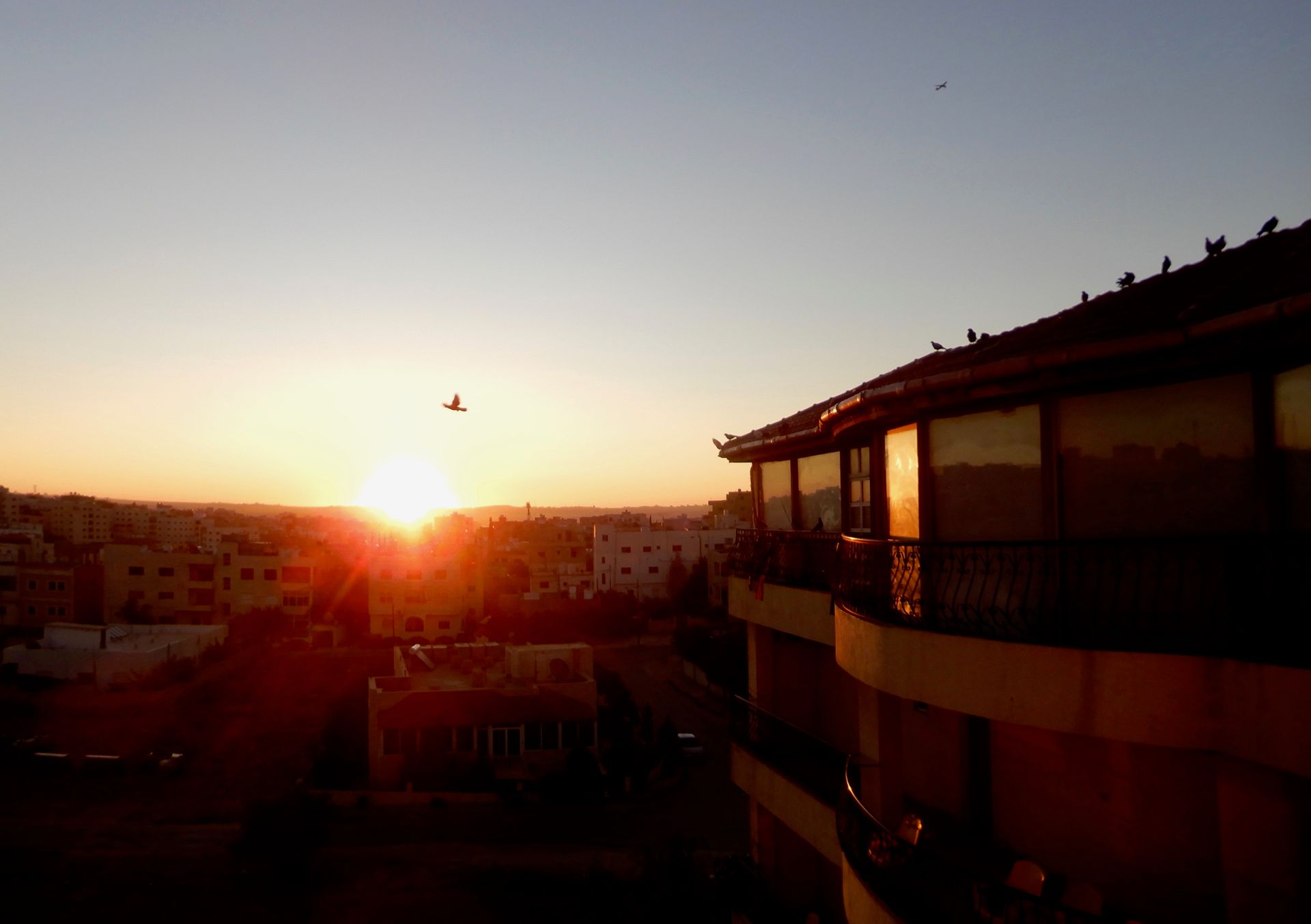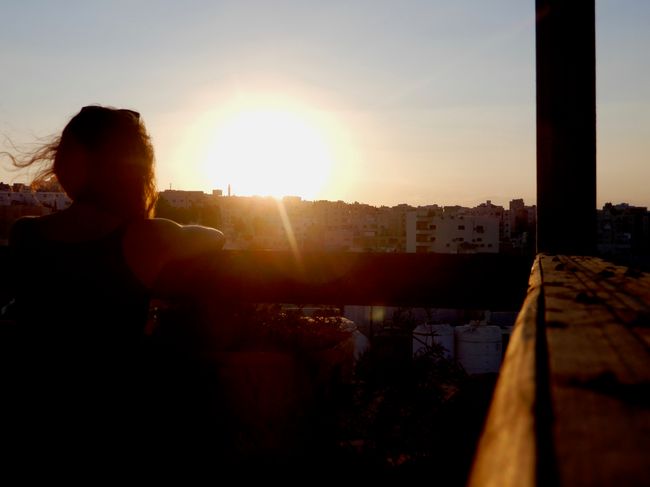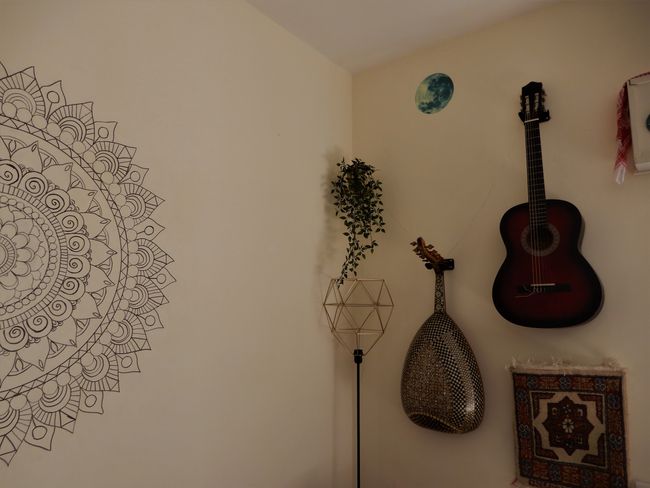No matter what - the main thing is Haifa
Foillsichte: 18.02.2020
Subscribe to Newsletter
Friday, February 14th
10 am. We start the day relaxed with the hostel breakfast and then make our way to the Carmel Market - the huge market in Tel Aviv where you can find not only lots of vegetables and fruits but also many other things. At the market, we once again notice that Shabbat is approaching - just like last Friday in Jerusalem, it is extremely crowded. We take our time to browse through the stands and then walk back through the center of Tel Aviv towards the hostel.
On the way back, I am once again aware of the contrast between this trendy metropolis and cities in the West Bank - if you only stayed here, you wouldn't even notice that the West Bank exists. I have the feeling that it is simply ignored here. When we mention to people in the hostel that we were in Ramallah (which we admittedly were very careful about), silence would probably have elicited the same reaction. Taking a break from everything feels good for a short time. But closing your eyes to everything that is happening here in the long run feels really wrong.
On the way back, we find an Ethiopian restaurant where we have a delicious meal and then sit down for a coffee in the common area of the hostel. We have decided to hitchhike later (we want to go further to Haifa in the far north, where Clara went yesterday), as buses are limited or do not run at all on Shabbat. So, we get some advice from locals in the hostel about the best spot, and then we're off.
After about 2 km of walking with our big backpacks, we are glad to have arrived at the spot where we should be able to hitchhike. But as we soon find out, we can't. After unsuccessfully sticking out our thumbs and occasionally changing our location a little, a pedestrian next to us stops and asks if he can help us. However, he speaks Hebrew. We try to explain to him that we want to hitchhike, but it feels like we talk past each other for a few minutes, until a minibus stops next to us with "Airport Shuttle" written on it. The driver doesn't go to Haifa, but he speaks good English and, after a brief exchange of words, offers to take us at least part of the way to a place better suited for hitchhiking. Alright, step by step.
While we would have expected a three-minute ride to a smarter place, we are now sitting in his minibus with him for half an hour until he drops us off at a bus stop on the highway about 20 km in the right direction. He tells us that all the cars here are going to Haifa. Good luck.
Having come closer to our destination, we now hold out our thumbs here as well. And we realize that this place is not optimal either. Although all the cars are going in the right direction, they are driving at such a high speed that many of them probably see us too late to stop. Moreover, it is already dark, which is not very helpful either. We see a car at the other end of the bus stop that has been standing there for a while, and we decide to ask the driver. We haven't even said 'hello' standing at his passenger door when he shakes his head and waves his index finger. However, he still rolls down his window and speaks to us in Hebrew.
We make it clear to him that we only speak English, and he asks us if we have no 'money'. We shake our heads, triggering an unexpected reaction. He reaches into his pocket and hands us two bills. We are perplexed at first, but then we understand that he really wants to give us money. We decline, but he insists. He is so aggressive that Lea eventually doesn't dare not to take the money. He keeps saying 'taxi, taxi!' to us.
We are a bit puzzled. We now have 40 shekels more, but that still doesn't change the fact that no car is stopping here. We have no choice but to continue holding out our hand until eventually a taxi stops next to us. After a short conversation, however, it turns out that he wants 360 shekels to take us to Haifa. We are really starting to wonder if we will ever get away from this place today.
At some point, a woman with luggage joins us, also waiting for some kind of ride from here and speaking very good English. We explain our situation to her, and she recommends that we walk a few more minutes to the next gas station to try our luck from there. While talking to her, another taxi stops, and suddenly the man who gave us 40 shekels earlier is standing next to us again. They are now discussing in Hebrew, and we don't understand a word, but we can tell that it is about us getting in the taxi. So, we start to protest, when our generous benefactor takes a bundle of banknotes out of his pants and almost forcefully hands Lea another 100 shekel bill. We are told to get in this taxi now.
The situation is really surreal, and we have no idea what is happening here. But our backs and arms already hurt, it's not exactly warm, it's already dark, and we are tired. So, we lack the strength and will to deal with other alternatives right now, which is why we just get in and let ourselves be driven to Haifa. During the ride, we ponder what benefit the man might have had from giving us a taxi ride to Haifa. And why he is standing in the middle of the highway at an abandoned bus stop apparently waiting for something. In our perception, he just wanted to get rid of us there. But anyway - we arrive safely in Haifa, where our taxi driver only wants 100 shekels from us. So, in the end, we made a profit of 40 shekels. That doesn't happen every day.
Arriving in Haifa, we contact other taxi drivers who speak good English and provide us with Wi-Fi so that we can contact Clara, who is already staying with Firas, a friend from Couchsurfing. Shortly afterwards, we are all sitting together in Firas' beautiful, sweet apartment and are simply happy to have arrived here. Later, a few more friends of his come by, and we spend a really nice evening together in a relaxed atmosphere. At some point, I almost didn't dare to think about that.
Subscribe to Newsletter
Freagairt


